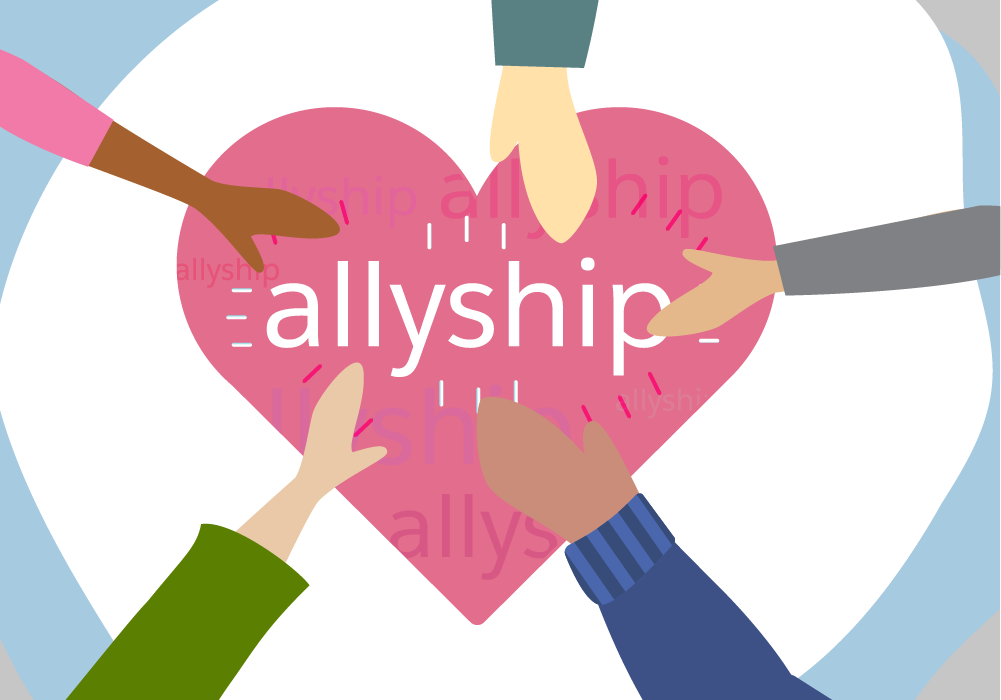Explore Allyship
Learning Objectives
After completing this unit, you’ll be able to:
- Recognize the impact of being an ally.
- Identify the difference between intention and impact.
- Summarize the role empathy, accountability, and forgiveness play in establishing allyship.
The Power of Allyship
An ally is an individual who acknowledges the social barriers and systemic oppression faced by underrepresented groups. Allies actively seek to understand the issues that impact these communities so that they can use their platforms and influence to create change. Simply put, an ally is someone who is not a member of an underrepresented group but wants to support and act to help others in that group.
One ally can be extremely powerful and make a difference in someone’s life—but imagine the power of a community of allies. When a large group of people can come together to amplify the voices of others and create a better environment for all, that’s when you can start to see tangible progress in equality.

Being an ally not only helps create a more equal society and world for all, it also helps you learn, grow, and find your voice. Being an ally empowers others and is also empowering. When you and other allies stand together, you have the power to create an unstoppable movement to drive tangible societal change.
Underrepresented groups often cite the feeling of being “the other” in the room. It’s often described as feeling isolated or intimidated—especially if something happens that only impacts that specific group. For example, imagine the only woman leader in a room cringing at a sexist joke that was casually made, but not feeling confident enough to address it for fear that she might be seen as difficult or cast out from the group. When only one person in a group is experiencing these forces, it can help to have someone who lends their voice to and advocates for them.
You have the power to ensure that even if someone is the only representative of their community in the room, they never feel powerless because they know that they have a passionate and caring ally.
Watch the short video on this page to learn more about the power of allyship.
Distinguishing Between Intention and Impact
It’s helpful to begin discussions about equality and allyship by distinguishing between intention and impact. The majority of the time, people have positive intentions; however, it’s the impact of actions and words that matters.
Think about times when someone expressed feeling hurt or disrespected by something that was said. The immediate reaction by the person who made the comment is usually to become defensive. This is where you might hear, “I’m not racist/homophobic/sexist” and so on. Imagine if, instead, they respond with, “I’m sorry. Please tell me what I said or did wrong; I want to learn from this.” This type of response helps us all have brave and honest conversations that we could learn from.
Accountability and forgiveness go hand in hand when you’re having difficult and powerful conversations. You must take responsibility for your impact on others, without getting defensive, as much as possible. It’s also critical that you forgive those around you for their own mistakes and missteps as you would like others to do for you.
Demonstrating Empathy, Accountability, and Forgiveness
Remember that becoming an ally isn’t instantaneous. It also isn’t simple. There can be many missteps along the way. It takes time to understand the issues that impact a community and to find your voice, or identify the next action to take. That’s okay. This is a journey, and as long as you move forward with empathy, accountability, and forgiveness, you can find your way.
Equality begins with empathy. When you seek to understand before being heard, you can greatly impact culture. You can strive to be a good human by seeing things from the perspective of others. Part of this is practicing mindful listening as you begin to hear more personal stories. This means listening to understand, rather than listening to respond, and taking the time to make eye contact, pause before speaking, and reflect on the information being given.
In the next unit, you learn the four key practices for being a great ally and how to put them into action.
